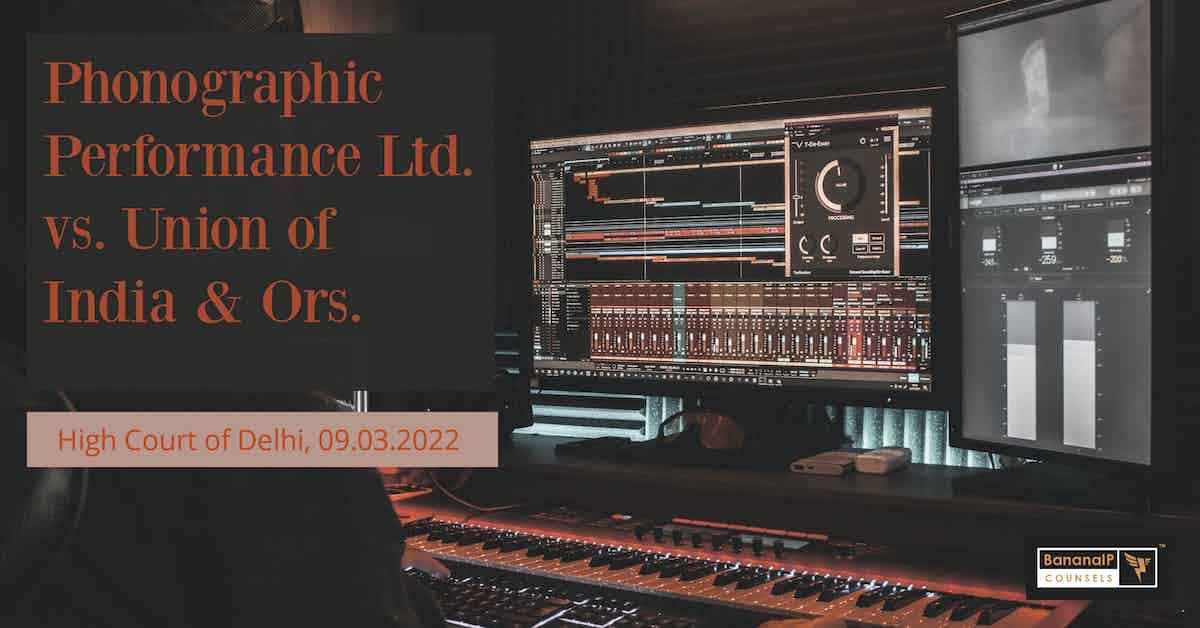Facts:
The Petitioner, Phonographic Performance Ltd., a company registered under the Companies Act, 1956, was a registered copyright society. It had assigned the copyright in various sound recordings for communication to the public in the area of public performance and broadcast, through which it owned/controlled the public performance rights of more than 350 music companies with 3 million international and domestic sound recordings. It provided a single window for various parties seeking a license for authorised use of sound recordings. In the year 2012, Section 33 (3A) was introduced to the Copyright Act, which required existing copyright societies to apply for a new registration post the amendment within one year. Further on 14th March 2013, the Copyright Rules were introduced through which the copyright societies applying for re-registration had to file an application in Form IX within a period of two months. The Petitioner, within one year from the enactment of the Copyright Amendment Act, 2012 and within two months from the enactment of the Copyright Rules 2013, filed an application for re-registration. The Petitioner alleged that Respondent 1 did not decide on the application for over a year. After waiting for over a year, the Petitioner began conducting its business as the delay impacted its ability to conduct business and thus filed for withdrawal of the application with an intention to file a fresh application. However, the request for withdrawal was rejected by Respondent 1. Therefore the Petitioner prayed for the issue of a writ of certiorari and writ of mandamus or any other direction for quashing and setting aside the impugned order and to decide the Petitioner’s application for re-registration.
Issues:
The issues before the Court were:
1) Whether the impugned order passed by the subordinate court was violating the principles of natural justice? and
2) Whether the Petitioner’s application for re-registration is maintainable?
Laws:
The Court referred to the Copyright (Amendment) Act, 2012, Section 33 of Copyright Act, 1957 along with Rule 47 of the Copyright Rules, 2013 with respect to re-registration of the application of the Petitioner.
Analysis:
The Court agreed with the Petitioner’s contentions that the unreasoned order passed by Respondent 1 was completely erroneous, incorrect, unreasoned, and arbitrary and contrary to the principles of natural justice and that Respondent 1 arrived at a conclusion without considering the facts and law. Respondent 1 stated that the Petitioner sought for re-registration but later also asked for the withdrawal of the same, thus the application would automatically be surrendered and that the Petitioner was not desirous to continue to function as a society and had withdrawn its application. Respondent 1 contended that the pending application was totally frivolous. Respondent 1 was of the view that the Petitioner was mismanaging and were acting as assignee of the authors, hence Respondent 1 did not grant re-registration, and this act was within their powers granted under Section 33(3A) of the Act.
The Court after considering various case laws and arguments made by the Respondents as well as the Petitioner stated that there was non-application of the mind by Respondent 1 in rejecting the application of the Petitioner without giving an opportunity of being heard. Respondent 1 had failed to decide the application on the merits and dismissed it on no valid grounds. The Court opined that Respondent 1 should have taken into consideration the rejection of the application of withdrawal and the office memorandum along with the correspondences revealing that the application of the Petitioner was being processed by Respondent 1 and there was no need for the Petitioner to correspond with them for the same.
Conclusion:
The High Court of Delhi held that the impugned order granted by Respondent 1 should be set aside and directed Respondent 1 to re-consider the Petitioner’s application for re-registration on merits as the application was filed within a reasonable time and the outcome of the same must be communicated the Petitioner.
Citation: Phonographic Performance Ltd. vs Union of India, decided by the High Court of Delhi on 9th March 2022, available at: https://indiankanoon.org/doc/196307224/, visited on 14th March 2022.
This post is brought to you by BananaIP’s Consulting & Strategy Department
About BananaIP’s Consulting & Strategy Department
BananaIP’s Consulting & Strategy Department has the experience of helping companies use IP for business and competitive advantage. Companies regularly seek their assistance, advise and opinions on identifying/mining inventions and creations, conducting IP audits, protecting IP assets appropriately, launching risk free products, managing litigation for business benefit, resolving disputes out of Court, making money out of IP, enforcing IP, and licensing transactions. If you have any questions, or need any clarifications, please write to [email protected].
Disclaimer
Please note that the content that forms part of this update has been put together from different sources, primary and secondary, and BananaIP’s reporters may not have verified the decision published. You may write to [email protected] for corrections and take down.



